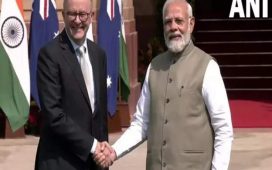Jonathan Raa | Nurphoto | Getty Images
Shares of Chinese tech heavyweight Tencent Holdings tumbled nearly 8% in Hong Kong after the company was added to a list of “Chinese military companies” by the U.S. Department of Defense.
The move mirrors an 8% fall in Tencent‘s U.S. depository receipts on Wall Street.
Other Chinese companies added to the list included battery maker CATL, which is part of the supply chain for automakers such as Ford and Tesla.
CATL shares, which fell as much as 5.6%, were last down 2.8% in Shenzhen.
The National Defence Authorization Act of 2024 says that the DoD will be prohibited from procuring goods or services directly from entities on the list in June 2026, and indirectly from June 2027.
In response to the decision, Tencent said in a statement that its inclusion on the list was “clearly a mistake.”
“We are not a military company or supplier. Unlike sanctions or export controls, this listing has no impact on our business,” the company added. CATL also called the designation “a mistake” in a response, saying it “is not engaged in any military related activities.”
Tencent has a good chance of managing to secure its exclusion from the list through U.S. courts due to the company’s business model, which primarily revolves around social networking and online gaming, said Ivan Su, senior equity analyst at Morningstar.
He pegs the fair value for Tencent shares at 704 Hong Kong dollars apiece, with represents an 86.14% upside to the current share price of HK$378.2.
Separately, Vincent Su, also senior equity analyst at Morningstar, said that CATL being included in the list “may discourage U.S. customers from purchasing the company’s energy storage system, or ESS, batteries in the future.”
The U.S. has been taking steps to restrict transfer of high-end technologies to China. Last year, it revoked certain licenses to sell chips to China’s Huawei in May and unveiled new sweeping export controls on critical technologies in September, including quantum computing and semiconductor goods.










